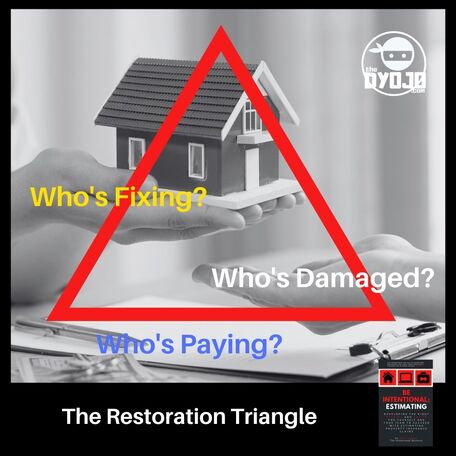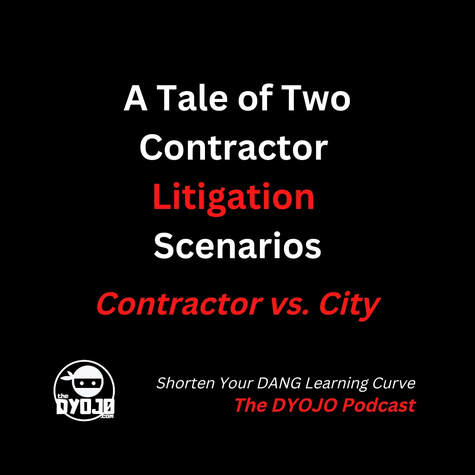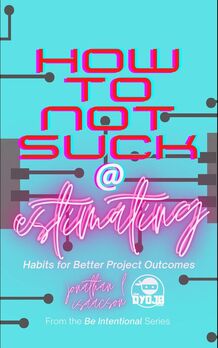|
In the wake of Hurricane Ian, Florida's Chief Financial Officer Jimmy Patronis went on television to warn consumers about unscrupulous contractors and public adjusters. Patronis refered to them as "locusts" and "predators" that complicate the recovery process. He encouraged residents to contact their insurance agent, carrier representative, or his office rather than any other party. He announced that there will be an "insurance village" where the government and the insurance companies are working together to write checks. The date of this speech was September 29, 2022 as part of a presentation with Governor Ron DeSantis. Florida CFO Labels Contractors and Public Adjusters "Locusts" and "Predators"Transcript from the Jimmy Patronis video shared above: Now here's the most important thing I need you to take away from this conversation. The predators that are going to come up, they're gonna initially try to sign up construction management contracts, public adjuster, they're going to come in like a bunch of locusts. And they're trying to hit the neighborhoods. And people are vulnerable right now. They're going to look for a solution. And their solution is always going to be important. But that solution is not going to be knocking on the door every time. If it sounds too good to be true, it is. Please, that first phone call that you're going to make needs to be to your agent, your carrier, or to my office at 1-877-MY-FL-CFO. If one of the first three phone calls you make in your house in order to get an insurance claim settled is one of those three, there's almost zero chance you can be taken advantage of. But, Panama City was my hometown, I lived through Hurricane Michael. We did. We did 12 Insurance villages there over a year sponsored. We're going to be here bringing the carrier's back. And they will write checks on site. Okay. But when you start complicating the claim, because you've allowed predators to get involved with your claim, you're going to drag it out. So the best solution is between you, your carrier, and us. The more people you bring into it, the harder it's going to be to get a settlement that's going to be fair for everybody. And look at the end of the day. If your carrier doesn't want to work with you. That's when you call my office and we'll take them to task." Predatory Practices During Insurance ClaimsIn a state whose insurance system is so much in disrepair and has come under so much scrutiny, not just in the last couple of years, but for quite some time now. There's no mention of the insurance company's participation, or the state's mismanagement, or the government's inability to effectively help shift things back into the right order. There is no accountability for Patronis, the government, or the insurance companies. Even the policyholders have some responsibility when consumers seize upon the opportunity to use an event to their Betterment rather than just to their repair. Patronis says, "The predators that going to come in like a bunch of locusts" while "people are vulnerable." No one would dispute that there are bad actors in all sectors. What left many people questioning his choice of words was the stutus of the insurance claims industry and process in his state. There are predatory practices in the insurance claims industry, Mr. Patronis places a lopsided amount of the blame on two parties in particular, contractors and public adjusters. Are door-to-door sales predatory? Are we to understand that if a consumer who has someone knocking on the door offering to provide a service that they need the logic of the CFO of the state of Florida says that they are likely a predator? If this is the case, what is his solution? Patronis instructs consumers to call their agent, their insurance company, or his office (the government).
Patronis says that if your first call is to one of the three members of the good team, "There's almost zero chance you can be taken advantage of." I think history has shown, especially in the state of Florida, that no one cares more for the consumer than the government and the insurance companies, right? The Jimmy Patronis Claims RemedyIf a policyholder who has severe damages to their home in the state of Florida follows Patronis' advice, how does the reader think this scenario will play out?
The policyholder calls their local insurance agent. Hmmm, does the reader forsee any issue there? A local insurance agent who lives in the same hurricane ravaged area as the policyholder. If they aren't dealing with their home and office being destroyed, what is the likelihood that their office phone is overwhelmed with similar calls? What is the chance that the consumer gets through to their local insurance agent, it's probably very low. So, what should they do, just keep calling and wait patiently until they can get through?
The policyholder calls their insurance company's claims line. After a catastrophic event, it's likely that they will get through quickly and that the carrier will have a representative out in a timely manner as well, right? The reader knows that hurricane recovery is a process and it takes time. But, does that mean the home or business owner should keep calling and wait patiently until they can get through?
The policyholder calls the office of Jimmy Patronis. After a catastrophic event, it's likely that they will get through quickly and that the carrier will have a representative out in a timely manner as well, right? The reader knows that hurricane recovery is a process and it takes time. But, does that mean the home or business owner should keep calling and wait patiently until they can get through?
Mr. Patronis says his office will model prior hurricanes and create an insurance village where carriers will be writing checks onsite. If the reader watches the video clip from The DYOJO Podcast or reads the transcript, Jimmy advises, "If it sounds too good to be true, it probably is." But of course, his statement wouldn’t apply to the government or the insurance companies (the good guys) only to the bad guys. If consumers don't wait for the government and the insurance companies to get their insurance village set up and then meet them there, Patronis says they are at fault? Protecting Consumers By Reducing Their RightsMost people listening to the Patronis speech get caught up in the "locust" comment. But there are so many items he brings up that are far more concerning. Jimmy wants policyholders to make the calls, wait for the answers, and then join him in the insurance village for their check. He warns consumers, "When you start complicating the claim, because you've allowed predators to get involved with your claim, you're going to drag it out." In summary, Jimmy says that policyholders complicate their claims and drag them out by allowing predators into the process. Jimmy says that policyholders complicate their claims and drag them out by allowing predators into the process. As we have said many times, The Restoration Triangle should be respected. The policyholder, the contractor, and the insurance carrier each have roles and responsibilities during the claims process. If the consumer does not believe that the claims process is going the way it should, that the policy is not being enforced the way it was sold to them, or the way it is stipulated in their insurance policy, then claims advocates, public adjusters, and lawyers are options well within their rights. When Patronis encourages consumers not to understand nor exercise their rights is the government playing its role in protecting the consumer? If there was a contractor or a public adjuster or a lawyer that was advising policyholders to ignore their insurance company, that could be a legitimate orange flag. The consumer, their contractor of record, and the carrier each has a role to play. The carrier should not overstep in the relationship between the contractor and the consumer. Nor should the contractor overstep in the relationship between the carrier and the policyholder. The claims questions should include:
Accountability For All Claims PredatorsPatronis says his office is going to "Be here, bringing the carriers back, and they will write checks onsite." His message is, "Come trust the government and the insurance companies. Don't exercise your rights to consult with a contractor, public adjuster, or a lawyer." What is the reason that a policyholder should not exercise their rights? According to the CFO of Florida, it will complicate the process of reaching an outcome that is “fair for everybody”. Bad actors should be called to account. Yet, the disbursement of consequences is as lopsided as the disbursement of funds from those holding the policy monies. As we have discussed before, if a policyholder is negligent or misrepresents the truth on their claim (i.e. fraud), they can be criminally prosecuted. If an insurance company delays, denies, or defends a claim, to the detriment of the policyholder, they are often civilly prosecuted at most. The consumer may go to jail while the carrier may only pay a fine. As David Princeton, author of the C&R Magazine segment “Dear David”, mentions in the closing segment of this video clip from The DYOJO Podcast, "Is there something that needs to be done? Certainly. But I also think something needs to be done on the carrier side because at least on the public side there's scrutiny to look at that and on the carrier side there's no scrutiny." This video and this article are not dismissing the reality of predatory practices by contractors, public adjusters, and lawyers, but calling for equal scrutiny of the people claiming to be the solution. The DYOJO Podcast Episode 100 will feature Bill Wilson, author of When Words Collide: Resolving Insurance Coverage and Claims Disputes, as well as David Princeton, Advocate Claim Service.
0 Comments
On Episode 95 of The DYOJO Podcast we discussed A Tale of Two Contractor Litigation Scenarios.
These are two very different litigation experiences. We discuss some of the ways that they are similar and mostly the areas where they diverge. We highlight some of the important lessons contractors can learn from both scenarios. Guest Whitney Wiseman, a contractor out of Palm Springs, Florida joins us to share his insights. He reminds his peers in property restoration, "We are a specialized trade in the construction industry. We all should act like contractors. We should be professional in our state as our state regulates us to. And we should utilize everything that is in our power in order to protect ourselves from a customer screwing us over." Tale #1: RJ Construction v. AI School DistrictOn prior episodes of The DYOJO podcast we've been talking about a case out of Texas. One of the local news broadcasts summarizes this litigation tale in this manner, "An Arlington construction company says it worked around the clock last February [2021] to clean up a flooded school. Months later it says it has yet to be paid." This is in reference to Robert Jordan Construction (RJC) versus the Arlington Independent School District (AISD). In this case, Robert Jordan Construction responded to flooding after Winter Storm Uri hit the area in 2021. RJC thought they had an agreement about the scope and the cost, but they discovered (or ignored) that was not the case. We've been unlocking as many of the pieces to that story as we've been able to find in the court documents and public records. So it's brought to light some questions, some teachable moments for contractors, especially for those who are new or newer to larger projects. On an insurance claim project like this one, there are multiple parties are involved. It's not just the customer, the insurance company, and the contractor. Whitney Wiseman reminds contractors, "What we're talking about today, which I think is so important," is for all contractors to, "Do your job. Do your documentation. Be transparent. Be a stand up contractor. If you do those things, you shouldn't end up in a situation like homeboy did out in Texas." Tale #2: Conway Construction v. City of PuyallupTale number two is a case that came across the desk here at The DYOJO Podcast. It's called Conway Construction versus the city of Puyallup. Some of you may recognize that is the town that I currently reside in. It's just outside of Tacoma, which is just South of Seattle in Washington State. Are you aware that when a contract is terminated, there's two terms under which it can be terminated:
These distinctions are something that all contractors should be aware of and ensure they are addressed in their contracts. There needs to be specific language that outlines what happens if the customer finds a defect or is unhappy with the performance of the contractor. Language should include a description of the notification process as well as how the contractor will respond. Usually the customer is responsible to notify the contractor of a defect in writing. The contractor will have X number of days to come up with a remedial plan that is agreeable to all parties. If the issue isn't resolved with the corrective actions, or if the parties can't come to agreement, then the contract explains how the process will proceed. One of the most important things any contractor and customer can do to avoid litigation is to agree on a process for how disagreements will be resolved. In the event that the worst happens, how will both parties terminate the agreement with the least amount of collateral damage? If the customer is going to terminate the contract for cause, there is a process. Every contractor should have a conversation with their client explaining that if they believe there's something wrong with the project, the contractor has first rights to try to remedy the issue. A quality contractor wants to make things right. If this process is outlined in the contractual agreement but the customer doesn't follow that, as the City of Puyallup didn't follow their own contract, then they may surrender their default claim. Most contracts can be terminated at will, or for convenience, as long as no bad will is in play. So a customer doesn't need a reason to kick a contractor off of a job but they will need to follow the termination for convenience process outlined in the contract. Especially, as was in the case of Conway v. Puyallup, if the customer was the one that drafted the contract terms. This case reminds contractors and customers to be aware another item which is "the plain and ordinary meaning" of the words utilized in the contract. The Supreme Court of Washington emphasized when the contract terms are clear, the court will enforce it as written. As a contractor, it is important that a non-legal person can read and understand the contract. Two Types of Contract TerminationWithin the contract between Conway Construction and the City of Puyallup, it stated that a termination for convenience would entitle the contractor to greater damages than if it was terminated for cause. Under the agreement, a contractor terminated for convenience was entitled to be paid for all actual work performed until the date of termination. While the city terminated the contract claiming it was because of the contractors alleged breach of the agreement. When the trial judge reviewed the facts they ruled that the termination was not for cause. Since the termination was not for cause, the contract terms converted the termination of Conway Construction to one for convenience. The Supreme Court of Washington ultimately affirmed that decision. The high court reached this conclusion simply by reviewing the plain language of the contract. The termination for cause could only be based on defective work if the contractor neglected or refused to correct rejected work. This mutual agreement further provided that upon 15 days written notice the contractor had to remedy the work to the satisfaction of the city. If the reader has been following our review of RJC vs. AISD, they will note that the facts of this Conway case vary significantly from those outlined in the Robert Jordan court documents.
A contractor should document everything from the agreements that they make, the conversations that they have with any party to the project, and any essential communication related to defects, defaults, and remedies. A typical communication (or Comms) log, such as those we have recommended before on the podcast, might include:
The contractor in this case was able to document that it took steps to remedy the alleged defaults and reached out to the city to determine if the corrective efforts were sufficient. The city however, refused to meet with the contractor. The trial judge therefore found that the contractor was not neglecting or refusing to correct the defect and that the city's failure and refusal to meet with the contractor to discuss the remedial actions was unreasonable or made in bad faith which had the effect of making the termination one for convenience rather than one for cause. The court stated their decision was thereby bound by the terms of the contract. Customizing Construction ContractsRegular listeners will remember Bebo Crain form our prior discussions regarding RJC v. AISD. Bebo believes, "You gotta adapt your situation. Each project has different amounts of risk and the protections [in your contract] depend on the amount of risk. I recommend getting a lawyer that will sit down with you to write a contract for your situtaion. You write out the things that you have done wrong and identify those as your risks. As more risks come you will work with your attorney to add those to your contract. It can be an evolving contract. As you obtain more situations that you feel you might be entering risk and learn how to hedge that risk with your contract and your disclosures." These two litigation scenarios remind contractors of a couple of key elements:
A contract is agreed to by both parties. In the RJC case one of the arguments is whether there ever was an agreement in place. In the Conway case, the contractor signed off on the process of default and made a good faith effort towards addressing the issues that the customer brought to their attention. In the RJC case we shared a news clip that says the school district is asking for documentation that the contract says doesn't exist. In the Conway case the contractor documented their process all the way through the project. Their documentation was sufficient enough that it held up in court. Conway was able to show they were within the terms of the agreement. According to court proceedings in the Conway case, the customer came to the contractor with the defect issue(s). Upon 15 days written notice the contractor had to remedy the work to the satisfaction of the city. The notice from the customer was to be in writing. It is usually in everyone's best interest to attempt to settle a disagreement prior to going to court. In Conway, the contractor received notice, made the corrections, and documented their follow through. It is important to be able to present documentation of agreements, phone calls, emails, text messages, meetings, and any other form of communication with the client. The contractor showed:
The contractor can say, we understand the language of the contract, we did the right thing, because we followed through with the remedial action, and we documented our processes. The court read the agreement, saw the facts, and concluded that this termination was no longer for cause. In this case the language of this contract was dictated by the city. This is often the case for government work, where the government entity presents the bidding terms as well as the terms of the agreement. The contractor should therefore carefully read their agreements, especially when the agreement is drafted by the other party, and understand all of its terms before signing. Then if the dispute arises, the contractor can use the plain language of the contract to argue in support of its position in the dispute. Learning From Contractor PodcastsFrom the feedback we have received on our podcast, contractors enjoy hearing other contractor's stories. It can be helpful to hear from someone else who has been there and done that. It is good for contractors to shorten their learning curve but they should understand that they cannot outsource or replace their learning curve. Gaining experience and adapting your operating procedures are critical to building a sustainable business. Whitney Wiseman encourages restoration contractors to, "Reach outside of social media. Find individuals who excel in their space. Make sure that you learn as much as you possibly can from these individuals who are not trying to make money off of you and truly want to be your mentors." Mr. Wiseman paused during our discussion because he sees an issue. He says, "I see more mentors in our industry right now that want to make money off of everybody who's green, then I do individuals who are just willing to help. And to me, that's sad, because I came up in this industry where there were people who would answer their phone, give me the advice that I need, and it was free. But right now it's a weird world." While Whitney advises that contractors are cautious with whom they trust, he also says, "There's a lot of people, though, that can really help you to be the best in the industry. Reach inside the industry for those people. But, when it comes to contracts, when it comes to business, when it comes to all these other things, get as far outside of this industry's mindset as you can and started attacking it as a professional. For instance, we [property restoration contractors and claims professionals] are a specialized trade in the construction industry. We all should act like contractors. We should be professional in our state as our state regulates us too. We should utilize everything that is in our power in order to protect ourselves from a customer screwing us over. At no point in time should we use these shortcuts in order to gain success because I can guarantee every single person the long road is worth it every single time versus the shortcuts. Learn from my mistakes." Lesson Learned from Storm Response WorkshopIf you would like to be in person with people that are experts in the industry that have years and years of experience, and are sharing their stories, join us Thursday, January 26, 2023. The DYOJO is traveling to Naples, Florida, for the Andrew Ask Building Science Symposium (aka Winter Break 2023). Andrew Ask runs Tuesday and Wednesday, then separate from that but at the same location, Pete Consigli and Jon Isaacson will be putting together a one day workshop titled Lessons Learned from Storm Response and Hurricane Recovery. Be there or be square.
An unexpected winter vortex rips through Arlington, Texas in February 2021 causing incredible damage throughout the South. Contractor Erick Hernandez who works in the Houston area notes that in the days prior everything seemed normal. Like many Texans, Erick was scrambling to save his home from the effects of freezing conditions and widespread lack of power. Catastrophe Damage ResponseRJ Construction (RJC), a local contractor, hears of damage sustained at Sam Houston High School. According to owner Robert Jordan, "My company sprung into action. Over the course of days, near round-the-clock work, Sam Houston was dried in and dehumidifier." Even though RJC says that certain school officials guaranteed that they would get the company paid and thanked them for their work, Jordan says that they have not been paid for their invoice totaling over $1.2 million dollars. It's hard to drive from the backseat after the ride is over." - Bebo Crain Contractors Suing For PaymentRJC has sued the Arlington Independent School District (AISD). So, I invited Bebo Crain (Jonesboro, AR) to review the court documents with me so that we can extract as many lessons to help contractors shorten their DANG learning curve as possible. As Bebo says, "It's hard to drive from the backseat after the ride is over," but we will do our best to share the many lessons that can be learned from this case. This upcoming series of episodes on The DYOJO Podcast will reveal information that will help contractors respond to everyday insurance claims, regional damage events (such as Winter Storm Uri from 2021), and catastrophe responses (such as Hurricane Ian in 2022). IN THIS EPISODE:
0:00 Episode 92 1:50 Customer used contractors estimate to hire someone cheaper 3:20 A new series - RJC vs. AISD 5:55 RJC's YouTube video received over 33,000 views 9:06 Winter Storm Uri timeline 12:04 Input from Houston contractor Erick Hernandez 15:13 "It's hard to drive from the backseat after the ride is over" - Bebo Crain 18:05 Breaking down the response with Bebo 22:51 Questions about insurance coverage during storm response Thursdays are for The DYOJO Podcast - helping contractors shorten their DANG learning curve for personal and professional development. Contractors in the propeprty restoration industry will often come across hazardous materials, two of which are asbestos and mold. Episode 83 of the DYOJO Podcast discusses these key items of concern as well as the precautions that should accompany for proper testing and removal. Listening to this episode will inform owners, managers, and restoration professionals on why they need to know if asbestos or mold is being dealt with. This article will review how the intentional restorer should structure their mindset and habits for success when dealing with mold and asbestos in construction materials. Mold and Asbestos in Construction MaterialsThere exists a dangerous mindest that asbestos containing materials (ACM) are a thing of the past, the reality is that they are still found in current construction and building materials. These materials can be hazardous to people’s health, including workers, occupants, and anyone who comes in contact with the structure. Asbestos is a legally regulated material. The restoration contractor MUST be mindful of what materials they are dealing with before any kind of demolition is performed. Asbestos becomes troublesome when it becomes friable (aka airborne) when stirring up dust while making flood cuts or removing other materials. Air movement over an area of drywall that has microbial growth on it, in an attempt to dry it, can spread mold spores throughout the home and potentially spread mold to previously unaffected areas. Mold and Asbestos at the WorksiteDue to the particulate matter of asbestos and mold, their protocols are similar. The contractor will need to make sure they are in compliance with regulations and standards. Each state is unique in how they handle asbestos, so each contractor will need to be mindful of the rules in the state (or states) they work in. Asbestos is regulated by law - there is no straying from the regulations without consequences, which could include steep fines and imprisonment. The contractor will want to be mindful of these so proper protection of their workers will be provided (respirators for technicians, properly sized via fit testing by a certified fit tester, etc.)
Mold and Asbestos Removal Best PracticesThe Institute of Inspection Cleaning and Restoration Certification (IICRC) has published ANSI standards for water damage mitigation and mold remediation. These property restoration standards are voluntary compared to those that are regulated for asbestos and other hazardous materials. The IICRC S520 is what outlines consensus standards for professional mold remediation. Owners, managers, and professionals who seek best practices will find these standards and training to be essential to their operations. The IICRC standards are a solid starting point, but restoration and remediation contractors may have to deviate when appropriate. Whether a project is typical or non-standards, the job is only as good as it is documented, and deviations should follow a clearly executed plan. Contractors should be careful not make any health claims when it comes to mold or asbestos. The job of the contractor is to successfully remediate the mold or abate the asbestos in the structure. Doctors are the ones that should discuss the health concerns of the homeowner, and the contractor should direct any health concerns to those qualified professionals. Intentional restoration contractors and their team members place a high priority on educating themselves on the scopes of work that they plan to perform so that they can keep their clients and their team members safe. Owners, managers, and contractors will do well to keep themselves out of needless legal trouble through studying and executing industry best practices.  GUEST CONTRIBUTOR: This article was written by Tiffany Acuff. Through a chance meeting of a friend, I was brought into the restoration industry. I have seen just about every aspect of working for a restoration contractor. I love this industry because it allows me to make a difficult situation a little bit better. I am constantly on the lookout for ways to contribute to the restoration industry as a whole so that we don't stay stagnant and continue to be leaders of mitigation and preservation. Tiffany has assisted in editing the last three books from The DYOJO, including the latest one, How To Suck Less At Estimating. It is possible, as an entrepreneur, a business owner, a manager, or an aspiring professional to do the wrong thing for the right reasons. Your intentions do not nullify the potential consequences of your decisions. Therefore, as a means of helping you shorten your DANG learning curve, we have solicited the aid of our good friend Ed Cross, The Restoration Lawyer, to clarify the role of industry standards in your service contracts. Imagine I am a well-intentioned water damage restoration contractor. I think it would be a good idea to cite the Institute of Inspection Cleaning and Restoration Certification (IICRC) S500 Standard for Professional Water Damage Restoration in my proposals and contracts. With his many years of litigation experience, how would Uncle Ed advise me to navigate this concept? Restoration Contractor (RC): Hey Ed, I just want people to know that I'm serious about what I do. So I've been talking to them a lot about how we train and follow the IICRC standards. Ed Cross (Uncle Ed): Comply with the standard of care. RC: That's why I thought thanks for confirming that. I'm thinking about putting it in our proposals and in our contracts. Uncle Ed: Don't put that in your contract! RC: But I want people to know that we're serious and that we do it right. Uncle Ed: Comply with the standard of care, but do not write into your contract, that you're going to perform the work according to IICRC standards. RC: Are you sure? Uncle Ed: it's not going to help you sell any jobs. It's going to marry you to these thick documents that are hundreds of pages long. All the plaintiff's attorney has to do is point to one sentence in there that you didn't strictly comply with and they’ll be able to shout about a breach of contract. RC: That doesn't sound good. Uncle Ed: You don't need that kind of headache. If you want to know more about The Restoration Lawyer and his involvement in the industry, watch our prior interview with Ed Cross or read the article in Restoration and Remediation (R&R) Magazine titled A History of Collaboration; A Future of Advocacy. If this information has been helpful, please subscribe to The DYOJO Podcast and consider purchasing one of the books from our Be Intentional series. edit. What comes to mind when you hear “bad faith” being used in a sentence with “insurance claims processing”?
According to the International Risk Management Institute, Inc. (IRMI), bad faith is, A term describing blatantly unfair conduct that exceeds mere negligence by an insurance company. For example, a bad faith claim may arise if an auto liability insurer arbitrarily refuses to settle a claim within policy limits, where an insured's liability is incontrovertible. How Does Bad Faith Affect Contractors?Our local networking group for restoration contractors and claims professionals will be discussing “bad faith” with licensed public adjuster and respected claims umpire, Roger Howson. If you are in Washington State, or the PNW, reach out to The DYOJO regarding the Fellowship of Construction Knowledge and Entrepreneurial Development (FoCKED).
In preparation for our conversation, we discovered this helpful from the Law Offices of Edward Cross. Brian K. Theis outlines three factors involved in determining whether there have been violations of the covenant of good faith and fair dealing for insurance claims. How Does Bath Faith Affect Homeowners?Insurance policyholders, which includes all homeowners, want to have the confidence that their policy will make them whole in the event of a water for fire damage to their greatest asset; their homes. Use this information to educate yourself and bolster your ability to advocate for what is right during the claims negotiation process. If you want to prevent unfair conduct during an insurance claim:
|
Words
The DYOJO - helping contractors shorten Archives
June 2024
Categories
All
EstimatingMarketingInsurance ClaimsLeadership |
|
| |||||||









 RSS Feed
RSS Feed
